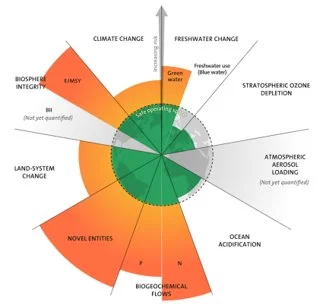Communicating Sustainability
Astrid Wynne | Jan. 27, 2023

Image credit: "Azote for Stockholm Resilience Centre, based on analysis in Wang-Erlandsson et al 2022"
Extreme weather events are not the only risk we face when it comes to environmental sustainability. The effect of temperature rises will affect biodiversity, soil quality, food, water and life in the oceans. Climate change is just one of the nine planetary boundaries which keep the ecosystem operating as it should. We are exceeding six of these nine boundaries… and two have not been satisfactorily measured yet. If we are going to come up with sensible solutions to the challenges we face, we need a balanced approach.
Our team at Interact has always known it is not just about carbon. Years of hunting down information on the exact material make up of servers, navigating the spaghetti soup of the supply chain with the international research project CEDaCI, has given us an inkling of the damage associated with production. Attempting to weigh this against the use phase impact of servers was the genus of the original research behind Interact; we wanted to know how to balance materials usage against energy usage.
Delivering IEMA training on Sustainability and Net Zero has enabled us to widen our view on this. With over 100 people trained from a range of backgrounds and businesses, we are beginning to understand the macro picture much better than before. Representatives from charities, legal firms, food companies as well as our own partners and stakeholders have come into the classroom with open minds and a willingness to attack the subject. As a trainer you provide the academic framework, terms and concepts. In return, you receive a wealth of different perspectives and solutions.
Enriching the learning process
I chose IEMA certified courses because of the organisation’s long-term commitment to sustainability and also because of its breadth of knowledge. Being a full member of the organisation and a Chartered Environmentalist qualifies me to deliver the training. The courses integrate lifecycle thinking into sustainability strategies whilst at the same time giving a deep dive on greenhouse gasses, their intensity rating, emissions and the value of nature-based solutions in combating the effects of climate change. They also give me the scope to explore real-life experience, which enriches the learning process for everyone in the room.
Assessing risk and opportunity, carrying out impact assessment on the operations of an organisation, making and working a plan are all familiar territory for many organisations. Just as we cannot improve that which we cannot measure, we cannot make positive changes to that which we do not understand. Having an opportunity to articulate what this looks like from an environmental sustainability standpoint – and to exchange and learn from the experience of others – have been really beneficial for the people who have taken our IEMA certified courses so far.
Eureka!
The risks we are facing as a species include climate change, ocean acidification, ozone depletion, nitrogen and phosphorous flows, freshwater depletion, change in land use, biodiversity loss, aerosol loading, chemical pollution. The effects of pressure on these planetary boundaries are food shortage, poverty, lack of infrastructure to support our current way of life, mass migration, conflict. Both sets of impacts are interconnected. So, if we want to effect positive change in one area, we need to understand the implications of our actions in others.
Solving these issues is nigh on impossible for anyone on their own, just as all great achievements have been. It took hundreds of thousands to build our great cities, amass our knowledge of disease and medicine and to develop space travel. Geniuses have had break-through revelations, but these are only adopted if large groups of people take the ideas on and make them work… which in turn requires smaller Eureka moments along the way. Training provides an ideal framework for some of these smaller Eureka moments as well as providing attendees with a better network to deliver change.
Are you ready?
Most organisations are now aware that they need sustainability strategies. Consumers are making buying choices on reputation. Governments and the market are asking increasingly exacting questions. Those who come to our training days are trying to arm themselves for this journey. They develop a proper understanding of the sustainability risks appropriate to their organisation through the academic content. They also benefit from fresh perspectives through peer-to-peer learning. We benefit from this too because it allows us to align our business development to the real needs of the market.
The Interact team is outstanding and developing new products to improve environmental performance. Our consultancy services are excellent at articulating how to use this information to develop better systems for cost, performance, energy and materials savings. Holding training session like these enable us to make customers aware of why we take the approach we do. They help our partners understand how their interventions fit into a wider picture. Finally, they help us to learn what the issues different organisations from different sectors face so that we can support them better.
Change is an integrated process that requires an ecosystem approach. Communication is key.
Register now for our next sustainability training course.